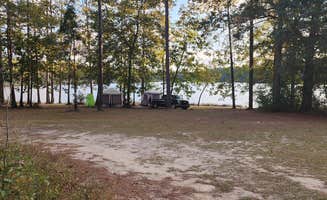Primitive camping near Bonifay centers around natural water features within the inland Florida Panhandle region. Campers access several undeveloped sites where permits are often required but facilities remain minimal. The terrain consists primarily of pine flatwoods and riverside areas, with elevation rarely exceeding 200 feet above sea level. Weather considerations affect camping conditions year-round, with summer humidity reaching over 90% and occasional flooding during the wetter months.
What to do
Fishing opportunities: Geneva State Lake offers productive fishing from dedicated docks where campers catch bass and bream. "Beautiful park to camp next to the lake with 2 fishing docks," reports camper Vand H., who notes the straightforward payment system makes access simple.
Trail exploration: Seasonal access to walking paths extends from camping areas, though timing matters. At Geneva State Lake, camper SJ W. mentions, "There are 2 hiking trails, more like atv trails that go to either side of the lake from the campground. You can go further into the forest but it was deer hunting season so I didn't explore."
Paddling access: Caryville Public Boat Ramp provides river access for kayakers and canoeists along the Choctawhatchee River system. The boat ramp serves as both camping area and water entry point, with camping typically allowed within 100 feet of the ramp area.
What campers like
Budget-friendly options: Free camping near Bonifay, Florida remains limited, but affordability stands out at Geneva State Lake. "The camping price is $2 per night, no reservation is needed, and is online payment," explains Vand H., making this location particularly attractive for cost-conscious campers.
Sunrise views: Morning light creates distinctive experiences at waterfront sites. "It was so peaceful and the sunrises over the lake were breathtaking," reports SJ W. about Geneva State Lake, highlighting the natural reward for those willing to camp with minimal facilities.
Solitude: The remote nature of camping areas near Bonifay provides separation from crowds. Sites typically accommodate fewer than 10 camping groups simultaneously, creating natural spacing between campers without formal site boundaries.
What you should know
Road conditions: Weather significantly impacts access to camping areas. SJ W. notes about Geneva State Lake, "It was about 5 miles of dirt roads to get in there and they were well maintained but I didn't want to risk it [in the rain]."
Payment systems: Most camping areas require permits purchased either onsite or online. "There is a QR code on the board to pay, or you can buy an annual pass for $40 if you plan on staying at least 9 days it's worth it," explains SJ W. regarding Geneva State Lake.
Limited facilities: Prepare for truly primitive conditions at most sites. While some areas have portable toilets, drinking water isn't available at the camping areas, requiring campers to bring all necessary supplies for their stay.
Tips for camping with families
Timing considerations: Plan family camping during hunting off-seasons for safer trail exploration. Hunting activity typically peaks November through January, potentially limiting hiking options as SJ W. discovered at Geneva State Lake.
Surface preparation: Bring equipment for uneven ground as campsites lack formal leveling. Multiple reviews indicate that tent campers should bring sufficient padding, and vehicle campers may need leveling blocks.
Wildlife awareness: The region hosts diverse wildlife including alligators near water edges. Keep children supervised within designated camping areas, particularly at dusk when wildlife activity increases.
Tips from RVers
Size limitations: Smaller RVs fare better on access roads and within camping areas. Sites won't accommodate large rigs, with most areas best suited for vehicles under 25 feet in length.
Leveling challenges: Bring substantial leveling equipment as natural terrain varies significantly. SJ W. mentions, "I drive a 20' van, so non-level is ok for me but these sites were not level," indicating preparation is necessary for comfortable vehicle camping.
Seasonal planning: Winter months provide more comfortable RV camping conditions with temperatures averaging 50-70°F compared to summer highs consistently above 90°F with high humidity.


